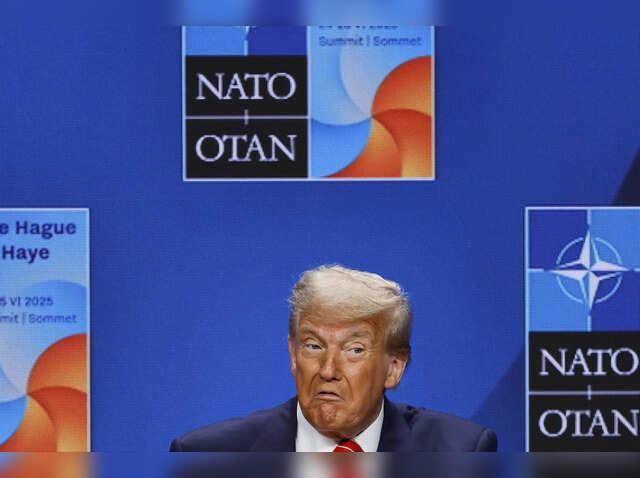Donald Trump’s Critique of Spain’s NATO Defense Spending Sparks Renewed Alliance Debate
Trump’s Rebuke of Spain’s Defense Contributions Amid Heightened Global Security Concerns
Former U.S. President Donald Trump has recently voiced strong disapproval of Spain’s defense expenditure within NATO, reigniting discussions about equitable financial responsibility among alliance members. Trump contends that Spain, despite reaping notable security benefits from NATO’s collective defense framework, falls short in meeting the alliance’s recommended defense spending target of 2% of GDP. He insists that Madrid must elevate its military budget to share the defense burden fairly, especially as geopolitical tensions intensify in regions such as Eastern Europe and North Africa.
Key elements of Trump’s criticism include:
- Spain’s defense budget currently hovers around 1.2% of GDP, substantially below NATO’s guideline.
- Risks associated with underfunding encompass diminished deterrence capabilities and heightened exposure to external threats.
- Advocacy for NATO reform to ensure a more balanced distribution of defense responsibilities among member states.
| Nation | Defense Spending (% of GDP) | NATO Benchmark (%) |
|---|---|---|
| Spain | 1.2% | 2.0% |
| United States | 3.5% | 2.0% |
| Germany | 1.6% | 2.0% |
Evaluating Spain’s Defense Spending and Its Implications for NATO’s Collective Security
Spain’s defense budget has been a recurring subject of debate within NATO, given the country’s strategic importance in the Mediterranean and Atlantic regions. Critics argue that Spain’s relatively modest defense outlay undermines NATO’s overall capacity to deter aggression and respond swiftly to crises. Even though Spain has incrementally increased its military spending,it remains below the alliance’s 2% GDP target,a benchmark many members strive to meet or exceed.
Despite the spending gap, Spain contributes significantly to NATO’s operational capabilities through intelligence cooperation, joint military drills, and naval missions. The table below compares Spain’s defense spending and key contributions with other prominent NATO members:
| Country | Defense Spending (% of GDP) | Primary Contribution |
|---|---|---|
| Spain | 1.2% | Naval operations and cyber defense initiatives |
| United States | 3.7% | Rapid global deployment and strategic deterrence |
| Germany | 1.5% | Modernization of land forces |
| France | 2.2% | Strategic nuclear deterrence and expeditionary forces |
While raw expenditure figures are often emphasized, Spain’s strategic value also stems from its diplomatic influence, geographic positioning, and specialized military roles. Nonetheless, mounting pressure from key NATO allies underscores the urgency for Spain to enhance its defense budget to preserve the alliance’s collective security architecture.
Expert Insights: Strategies for Spain to Fulfill NATO Defense Spending Goals
Spain stands at a pivotal crossroads as it endeavors to meet NATO’s 2% GDP defense spending guideline. Defense analysts suggest that beyond simply increasing the budget, Spain should focus on optimizing resource allocation to maximize military effectiveness. Emphasizing quality and strategic investment over sheer spending volume is seen as a prudent path forward.
- Modernize military assets: Prioritize acquisition of cutting-edge technologies to boost operational readiness.
- Enhance joint training: Expand collaborative exercises to improve interoperability with NATO partners.
- Leverage public-private partnerships: Engage domestic defense industries to foster innovation and cost efficiency.
Experts also highlight Spain’s unique geopolitical context, recommending tailored defense strategies that not only meet spending targets but also reinforce regional security. Implementing these measures can definitely help Spain affirm its commitment to NATO while ensuring sustainable defense growth.
| Advice | Expected Outcome |
|---|---|
| Defense Systems Modernization | Enhanced combat readiness and deterrence capabilities |
| Increased NATO Collaboration | Improved alliance cohesion and rapid response capacity |
| Optimized Budget Utilization | Greater defense efficiency and value per euro spent |
Policy Proposals to Bolster Spain’s Contribution to Transatlantic Defense
To strengthen its role within NATO and address critiques regarding defense funding, Spain should focus on strategic investments aligned with transatlantic security priorities. While increasing the defense budget is vital, ensuring that expenditures target modernization, cyber defense, and interoperability with U.S. and European forces is equally crucial. Spain’s geographic position as a gateway to the Mediterranean and Atlantic theaters makes it a crucial player in regional security, necessitating a flexible and responsive military posture.
Recommended policy actions include:
- Institutionalizing annual joint military exercises with NATO allies to enhance operational readiness and alliance unity.
- Expanding Spain’s participation in NATO rapid reaction forces and intelligence-sharing frameworks.
- Investing in advanced defense technologies,such as unmanned aerial vehicles (UAVs) and cybersecurity systems.
- Strengthening cooperation with U.S. military bases on Spanish territory to improve logistics and operational coordination.
| Focus Area | Policy Recommendation | Anticipated Impact |
|---|---|---|
| Budget Enhancement | Raise defense spending to meet 2% of GDP | Align with NATO standards and modernize forces |
| Joint Military Exercises | Increase frequency with U.S. and European partners | Boost interoperability and rapid deployment capabilities |
| Technological Advancement | Focus on cyber defense and UAV development | Strengthen intelligence and defense operations |
| Logistical Coordination | Enhance collaboration with U.S. military installations | Optimize joint operational readiness and efficiency |
Conclusion: Navigating NATO’s Burden-Sharing Challenges Amid Evolving Security Threats
The ongoing dispute between the United States and Spain over NATO defense spending underscores broader challenges facing the alliance in balancing national interests with collective security demands. While Spain defends its fiscal priorities and strategic contributions,Washington’s pointed critiques reflect persistent pressure on member states to reassess and potentially increase their defense commitments. This debate highlights the delicate equilibrium NATO must maintain to ensure unity and operational effectiveness in an increasingly complex and volatile global security habitat.










